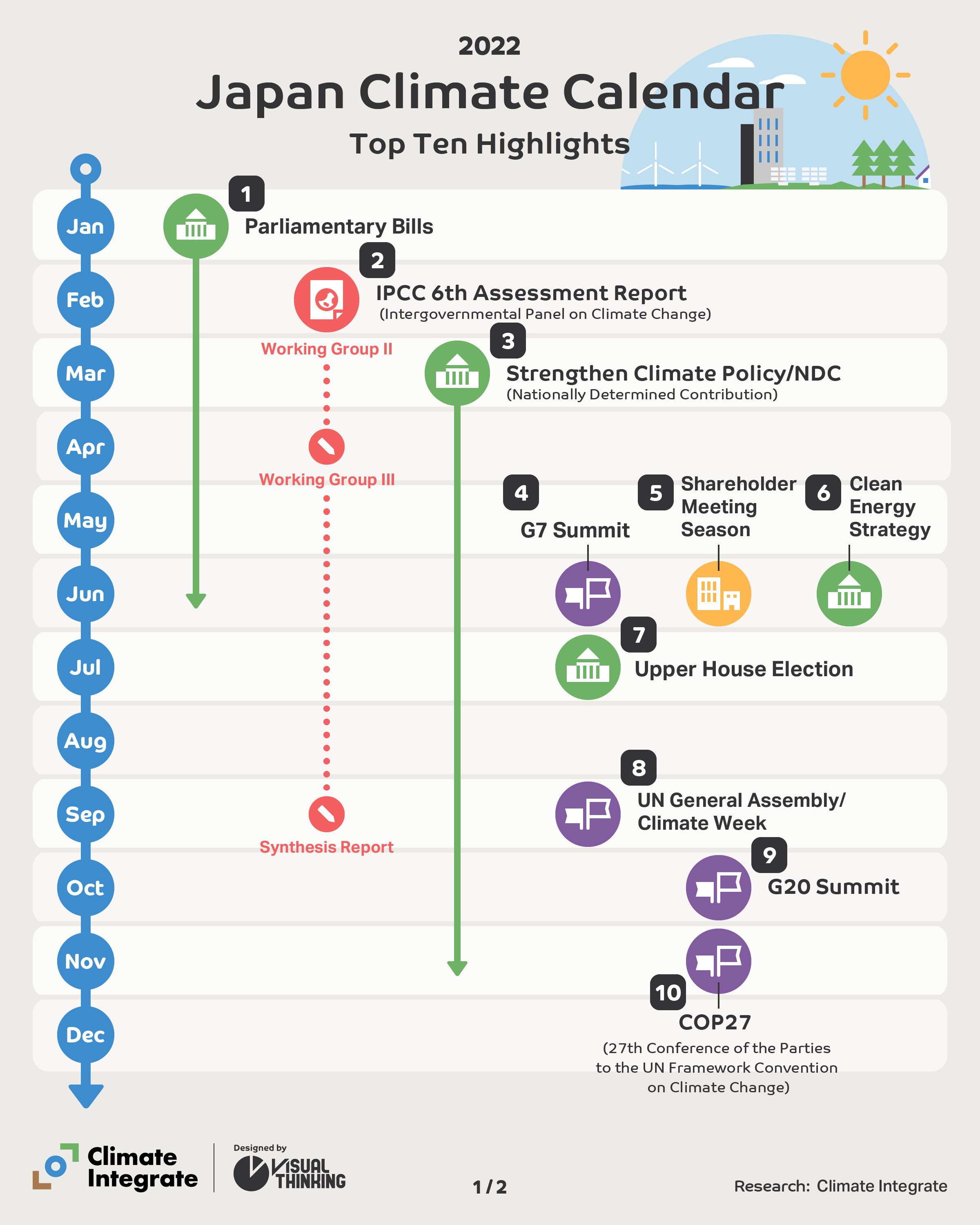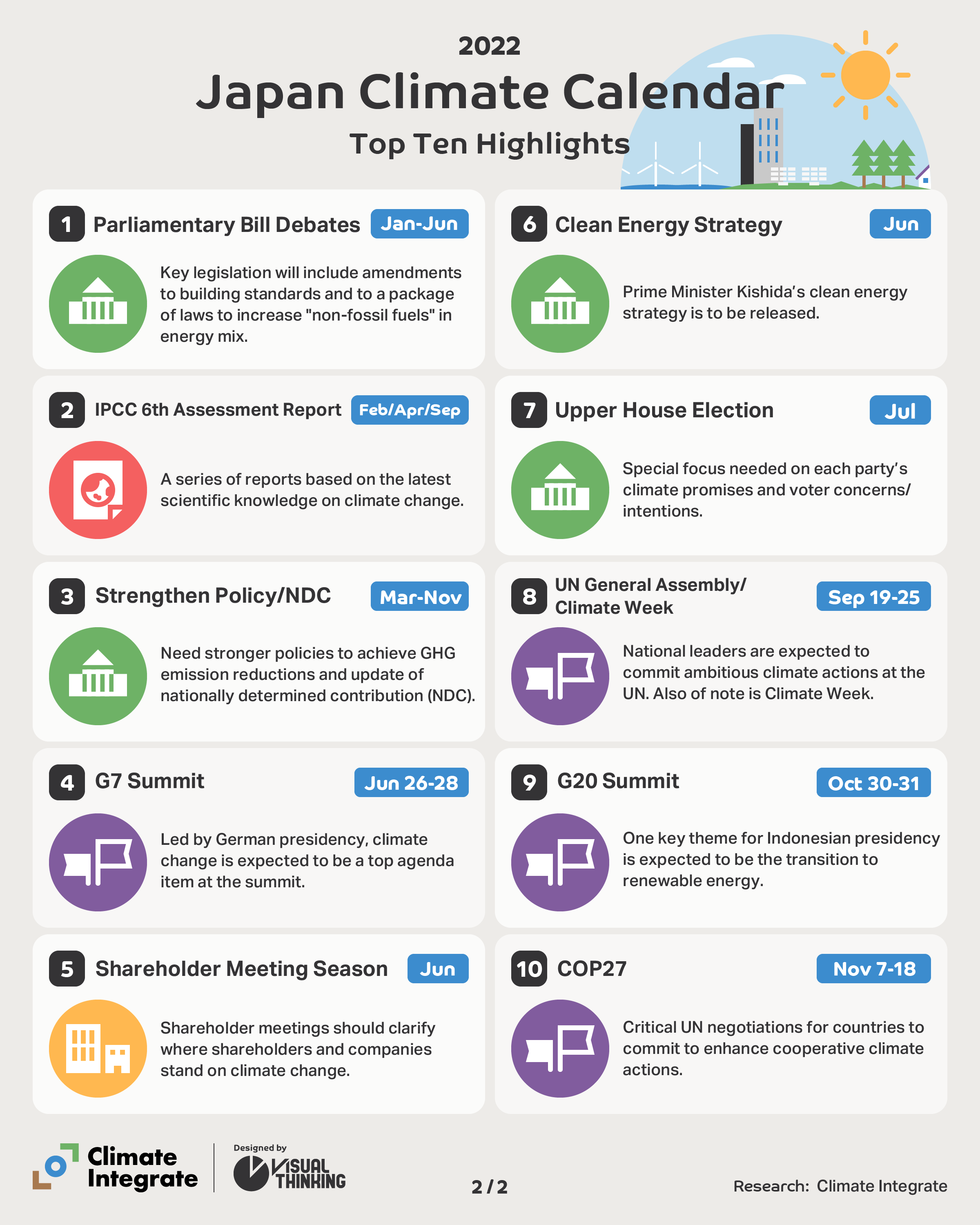
What will happen in 2022?
The COP26 Glasgow Conference in 2021 (26th Conference of the Parties to the UN Framework Convention on Climate Change) agreed on the goal of effectively limiting the global average temperature rise to 1.5°C. As current national targets, policies and measures fall far short of what is needed to achieve the 1.5°C goal, however, COP26 called on countries to revisit and strengthen their Nationally Determined Contributions (NDCs) before the 2022 meeting, with more ambitious targets for 2030.
The year 2022 will therefore prove to be a real test of whether or not countries can strengthen their targets and policies, inject a sense of greater urgency, and speed up implementation to close the emissions gap prior to COP27. For Japan, the most important questions are whether the country can raise its ambition from the current target of a 46-50% reduction (from 2013) by 2030, and whether it can implement important policy changes and enhancements to achieve this.
On the international scene, the publication of the Sixth Assessment Report of the Intergovernmental Panel on Climate Change (IPCC) will be completed in 2022, revealing the latest scientific insights. In response, whether the G7 Summit in Germany, the UN General Assembly, the G20 Summit in Indonesia, and finally, COP27, can build the needed political momentum and ramp up progress on climate policy is critical this year.
On the domestic scene in Japan, attention will be focused on the already-underway deliberations in the national parliament on crucial bills and the fate of related policy measures (such as the introduction of carbon pricing and pressure to reduce coal power generation). The tone of debate on key issue in the Upper House election in July will also attract attention. The corporate world will likely be watching closely as international sustainability accounting standards are established this spring as part of a global trend toward mandatory climate-related disclosures. Companies will be paying attention to how shareholder activism builds in the lead-up to Japan’s season of shareholder resolutions. Another important point will be how companies and investors will step up decarbonization policies.
Meanwhile, impacts of the Ukrainian situation on energy policy will be difficult to predict. It will be important to ensure that short term responses to the situation do not undermine efforts to decarbonize, even in the context of uncertainties about the future, shifting geopolitical interests, and crises involving energy supplies.

Commentary
1. Parliamentary Bill Debates (until June)
The regular Diet session in 2022 will be debating several items of legislation that are relevant to climate change and energy. Notable among them is the Act on Improvement of Energy Consumption Performance of Buildings, and a bundle of amendments to legislation that could accelerate the shift away from fossil fuels, including the Act on Rationalizing Energy Use.
A bill to amend the act on buildings includes mandatory energy efficiency standards for all new housing and buildings, plus the promotion of wood construction. These changes would still not be enough, but they would nevertheless be an important step toward carbon neutrality. Insulation standards for new construction are not fully mandatory in Japan, which is far behind other countries on this topic. To become more energy efficient, Japan needs to insulate its housing and buildings much better. However, there is a risk these amendments could be postponed as part of efforts to reduce the number of bills being submitted to the Diet. The bills are supported by citizens, industry organizations, and many others. Many voices are saying it is important legislation and it needs to be passed in the current Diet session, and it does get enacted soon.A package of amendments to energy-related legislation, (Bill to Amend Legislation Including the Act on Rationalizing Energy Use to Establish a Stable Energy Supply and Demand Structure), including the Act on Improvement of Energy Consumption Performance of Buildings, Act on Rationalizing Energy Use, Act on the Japan Oil, Gas and Metals National Corporation, Independent Administrative Agency (JOGMEC) Act, Electricity Business Act, Mining Act, and more, was bundled by the Ministry of Economy, Trade and Industry (METI), submitted to and then adopted by Cabinet decision in March 2022. In the Diet, legislators will discuss the whole package together. The amendments include language promoting decarbonization, encouraging industry to transition to non-fossil energy, requiring plans to be developed, and modifying electricity pricing to optimize power demand. However, it all contains some concerning contents. Critics question the appropriateness of including nuclear with renewables as “non-fossil” energy and promoting them together. In addition, some technologies being advanced in the amendment package are still based on fossil fuels. For example, ammonia, hydrogen, and carbon capture, utilization and storage (CCUS) are set to be added to JOGMEC’s mandate for investment and debt guarantee services. Careful deliberation will be needed in order to cover the important contents of this package of energy-related bills, but bundling everything together makes it a challenge to single out crucial individual issues.
2. Strengthening Policies and NDC (March-November)
In line with the strengthening of Japan’s target to achieve a 46-50% GHG emission reduction (compared to FY2013) by 2030, the government revised the Plan for Global Warming Countermeasures and Strategic Energy Plan in 2021 and resubmitted Japan’s Nationally Determined Contribution (NDC) and Long-term Strategy under the Paris Agreement to the United Nations, having re-calculated numbers for energy sources and emission reductions in each sector and aligned them with the reduction target.
It is essential for each sector to strengthen its climate measures, but in many cases, policies to support the required emission reductions are not in place. COP26 requested countries to revisit and strengthen NDCs for the year 2030, and so Japan needs to strengthen its current 2030 target and further improve its policies to achieve deeper emission cuts. In particular, it is important to raise the level of ambition of policies and measures in the following sectors:
Energy
– Enhance policy and reform markets to further expand renewable energy (electricity and heat) in the electricity mix by 2030; reduce and phase-out coal power; objectively review the use of nuclear power.
Manufacturing
– Strengthen policies to promote industrial transformation to decarbonize, reduce resource use, introduce renewable energy, boost energy efficiency in energy-intensive industries (steel, cement, chemicals, pulp and paper, etc.).
Construction
– Strengthen/mandate zero emission standards for new housing/buildings, strengthen policies to accelerate retrofits of existing housing/buildings to improve efficiency
Transportation
– Strengthen policies to accelerate transition to electric vehicles (EVs), promote modal shift by boosting convenience of public transportation
3. IPCC Sixth Assessment Report
WG II (February), WG III (April), Synthesis Report (September)
Between August 2021 and September 2022, the Sixth Assessment Report (AR6) of the Intergovernmental Panel on Climate Change (IPCC) is being released in stages, providing the latest scientific knowledge on climate change.
The Working Group I Report (Physical Science Basis), released in August 2021. stated that it is now “unequivocal” that climate change is caused by human influence and that impacts are evident globally, and pointed out that a significant reduction in emissions is necessary by 2030 if we are to limit the temperature rise to 1.5°C.
The Working Group II Report (Impacts, Adaptation and Vulnerability), released in February 2022, clarified that climate change has a wide range of adverse impacts on the environment and humanity, triggering losses and damages, and points out that if the temperature rise is above 1.5°C we will face even greater risks, the limits of adaptation are in the midst of being reached, and action will become even more urgent.
The Working Group III Report (Mitigation of Climate Change) is slated for April and finally, the Synthesis Report in September. Even within the scope of what has already been published, the urgency of taking actions has been more than adequately justified, and with these latest scientific findings released, there should be even greater pressure on countries to raise their targets and commit to greater climate actions at COP27 in November.
4. G7 Summit (Germany, June 26-28)
Germany will have the presidency of this year’s G7 Summit. Chancellor Olaf Scholz, who succeeded Angela Merkel and leads the coalition government, has put a priority on climate change and announced plans for a complete phase-out of coal power by 2030, in principle, earlier than the previous target of 2038. This is a significant decision for Germany, the world’s top producer of lignite. In February, Jennifer Morgan, former executive director of Greenpeace International, was appointed as Germany’s Special Envoy for International Climate Action. This shows signs that Germany will be strongly promoting climate diplomacy.
Germany plans to make climate change one of the key themes of the G7 Summit. The current administrations of the United States, Canada, Italy, France, Germany and the UK have taken a positive stance on tackling climate change. With the exception of Japan and the United States, the five other countries have committed to phase out coal-fired power generation by 2030. The United States intends to decarbonize its power sector by 2035, and Japan will be expected to up its gam. It is also expected that climate action will be further enhanced with the 1.5°C goal in mind, and further efforts will be sought to reach some agreement on ending support for fossil fuel projects overseas. However, the effects of the Ukrainian situation are difficult to foresee.
Incidentally, the next G7 Summit is set to be held in Japan in 2023.
5. Shareholder Meeting Season (around June)
The season for corporate annual general shareholders’ meetings in Japan is around the month of June each year. With decarbonization and ESG investment building momentum, companies are increasingly being pressed to manage and conduct business in line with the 1.5°C target of the Paris Agreement. Companies are also expected to respond properly to governance and human rights issues. Similarly, institutional investors such as pension funds, insurance companies, and investment firms are becoming more focused on accountability for sustainability in investment and financing. In Japan, NGOs, local governments, and hedge funds, and other organizations have been submitting climate related shareholder resolutions since 2021.
For shareholders and institutional investors, the weeks that elapse between the formulation of a company’s management policy to the exercise of voting rights at a shareholders’ meeting are an important time for engagement. The extent to which the decarbonization movement of companies and investors broadens in 2022 will be an important factor in achieving 1.5°C.
As for the disclosure of climate-related information, sustainability disclosure standards are being developed in a manner consistent with the recommendations of the Task Force on Climate-Related Financial Disclosures (TCFD). The final standards will be decided in the second half of 2022, and companies will then be expected to adhere to them.
6. Clean Energy Strategy (around June)
Under his vision for a “new capitalism” Prime Minister Fumio Kishida plans to announce a Clean Energy Strategy in June. Deliberations are being held by a joint committee of respective subcommittees under METI’s Industrial Structure Council and Advisory Committee for Natural Resources and Energy.
The Strategy is expected to focus on 14 growth sectors identified in Japan’s Green Growth Strategy Through Achieving Carbon Neutrality in 2050, which was formulated in 2021. The 14 sectors include renewable energy such as offshore wind and solar power, but others included are seen as questionable in terms of their effectiveness in reducing emissions, feasibility, and environmental impacts (for example, fuel ammonia, hydrogen, CCUS, and nuclear power).
In his speech to COP26, Prime Minister Kishida focused on promoting the use of ammonia and hydrogen in the power sector to achieve “zero-emission thermal power.” However, critics have pointed out cost, timing, and technology problems with trying to decarbonize by pinning hopes on innovative technologies and not ending thermal power generation that relies on coal or other fossil fuels.
There are hopes that the Clean Energy Strategy will promote investment that can actually contribute to the realization of 1.5°C and promote a rapid energy transition. However, the current approach seems more centered on promoting innovation based on Japan’s existing industrial structure. Instead of delaying or suppressing this all-important transition, Japan needs a strategy that can accelerate it.
7. Upper House Election (July)
The 26th regular election of Japan’s House of Councilors will be held in July (until July 25). Half of the members are elected every three years, and their term of office is six years. This time, 124 + 1 (a vacancy), will be elected, representing half of total 248 members.
This election will be seen as an opportunity to evaluate the performance of the Kishida administration. The election is expected to focus on the COVID-19 pandemic response, economy and social welfare, but reflecting the current instability of the geopolitical situation, security, diplomacy, and energy may also arise as major themes. Climate change and decarbonization are not expected to rank among top issues for both the ruling and opposition parties. However, much will depend on what concerns are expressed by voters, and how the urgency and scale of climate issues is perceived in relation to energy challenges surrounding the Ukrainian situation.
How candidates and political parties address climate and decarbonization will be an indicator of the status of climate politics in Japan. Of great interest will be policy pledges made by each party in terms of raising Japan’s NDC targets, transitioning from fossil to renewable energy, dealing with ammonia and hydrogen, carbon pricing, measures for manufacturing, construction, and transportation. Of additional interest will be their targets and policies for a just transition of the workforce toward clean industry.
8. UN General Assembly / Climate Week (New York, September 19-25)
It was in 2009 that the UN Secretary-General hosted the first Climate Summit in conjunction with the UN General Assembly, which is held every September in New York. Since then, many events have been held every year under the banner of Climate Week, a week-long period straddling the summit. In 2022, the Climate Summit is set for September 20, and Climate Week is set for September 19-25.
The timing of the annual UN General Assembly is politically important for the success of the COP Climate Conference, as it is there that national leaders express their commitments to addressing climate change, just a couple of months before the COP meeting, which is held in November or December. To build momentum toward stronger action for decarbonization, Climate Week features events to introduce a variety of ambitious initiatives, and is held with the involvement of governments and led by many non-state actors, including the Climate Group, a group of companies with high climate ambitions. However, recent meetings has been held virtually due to COVID-19, which has meant that the number of participants going from Japan and the amount of information making it back to Japan have been limited.
9. G20 Summit (Indonesia, October 30-31)
The G20 Summit (Group of 20 economic and financial leaders) will be held in Bali, Indonesia, on October 30 and 31, 2022. Indonesia is the only member of the Association of Southeast Asian Nations (ASEAN) to participate in the G20, and this is the first time for the G20 to be held in Southeast Asia.
President Joko Widodo has indicated that the G20 themes will be global health architecture, sustainable energy transition, and digital transformation. Climate change is expected to become a key topic.
Indonesia is actively mining coal, oil, and natural gas, and is an energy exporter. Coal is also heavily used domestically. On the other hand, renewable energy has huge potential here. Until recently, Indonesia was receiving coal power plant technology from Japan, but in 2021, it declared a goal of being carbon neutral by 2060 and has set a course toward decarbonization. As COP27 will be held just one week later, progress at G20 will have important implications.
10. COP27 Climate Conference (Egypt, November 7-18)
The 27th Conference of the Parties to the UN Framework Convention on Climate Change (COP27) will be held from November 7 to 18, 2022 at Sharm El Sheikh, a tourist destination in Egypt.
With the full IPCC Sixth Assessment Report having been released and the urgency of climate change well understood, this will be an important meeting, expected to make significant progress in terms of measures to be taken by each country. A key focus will be on having countries strengthen their NDCs for the year 2030 and ensuring they will be implemented.
In addition, as this COP meeting is being held in Africa, considerable attention will be paid to the topic of supporting developing countries, particularly the most vulnerable ones. Progress is also expected in negotiations on climate finance, adaptation, loss and damage.
Meanwhile, considerable efforts have been made in past years to make COP meetings transparent to civil society, but some concerns have been raised about whether or not the government of Egypt will be able to run the meeting democratically and give civil society much opportunity to participate.

